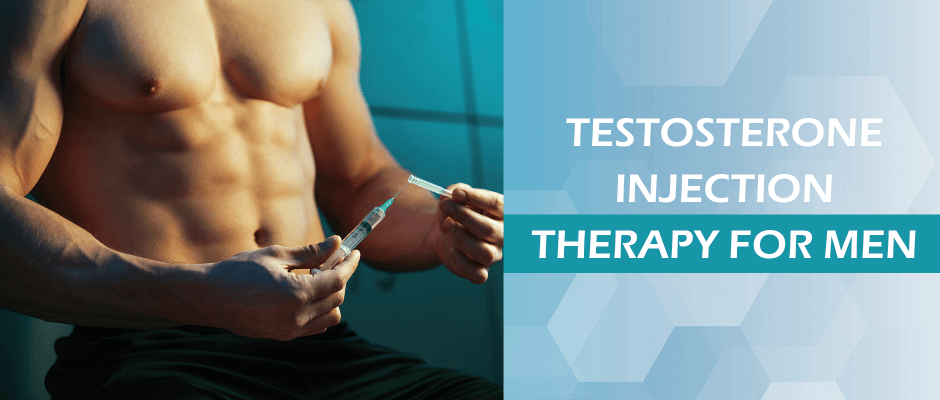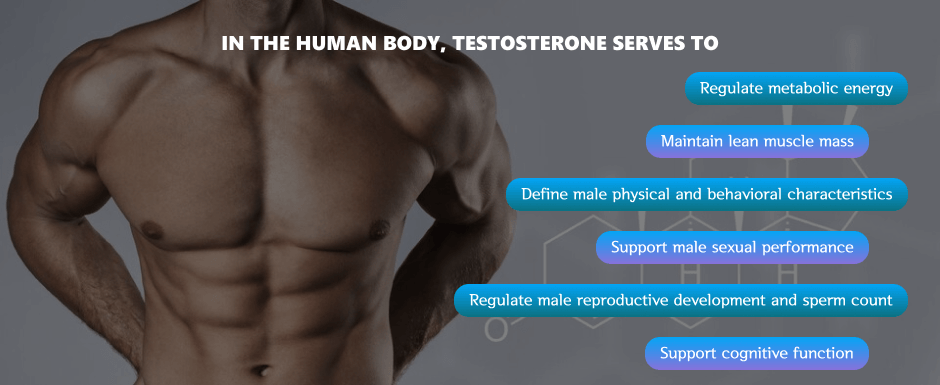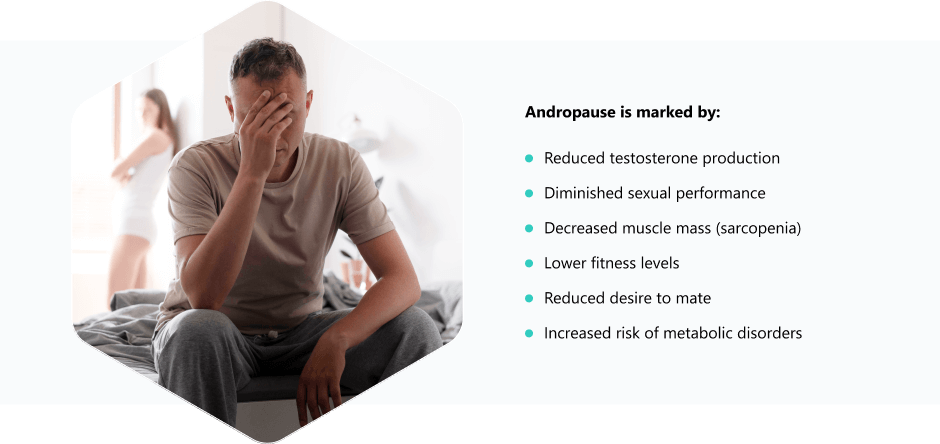
Testosterone is a potent androgen that plays multiple roles in the metabolic health of both men and women, although female testosterone levels are much lower. Normal testosterone levels for adult males range from 800-1,200 nanograms per deciliter (ng/dL), while normal levels for females are 100-200 ng/dL. In recent decades, environmental toxins found in food, air, water and plastics have begun to erode male testosterone, causing lower sperm counts and reduced sexual performance.
Learn about the function of testosterone in the male human body, the relationship between age and testosterone levels, symptoms of low testosterone, and how testosterone injection therapy can help restore optimal testosterone levels in men.
Role of Testosterone in Male Biology
Testosterone is the primary male sex hormone, mostly produced in the testes. Testosterone is classified as an androgen, a group of diverse steroid hormones.
In the human body, testosterone serves to
- Regulate metabolic energy
- Maintain lean muscle mass
- Support cognitive function
- Define male physical and behavioral characteristics
- Regulate male reproductive development and sperm count
- Support male sexual performance

According to one source, human sperm count has been steadily declining globally over the past several decades, with as much as a 50% reduction over the past 50 years. Human fertility rates are also plummeting, and many countries are facing a population crisis as reproduction rates fall.
Testosterone affects more than male reproduction. Reduced testosterone levels are associated with an increased risk of heart disease, metabolic syndrome, and type 2 diabetes.
Symptoms of male low testosterone include:
- Decreased sex drive
- Loss of bone density
- Erectile dysfunction
- Increased body fat percentage
- Low sperm count
- Depression and mood swings
- Sleep disorders
- Chronic fatigue
- Reduced muscle mass and strength
Causes of Male Low Testosterone
Testosterone levels naturally taper off as you age, declining about one percent per year after age 30. But there are a number of epigenetic factors that accelerate testosterone decline, even in younger men. In particular, phthalates – a large family of chemicals used in a wide variety of consumer products – appear to act as endocrine disruptors that dramatically impact testosterone production. In Western countries, it is impossible to protect yourself 100% from exposure to phthalates.
Phthalates can be found in:
- Personal grooming products like soaps, shampoos, deodorants, lotions, perfumes and more
- Plastic bottles and plastics used to package foods
- PVC pipes used in plumbing
- Water contaminated by commercial waste
- Seed oils used for cooking and found in processed foods, including canola, soybean, cottonseed, safflower seed, palm seed, grape seed, and others
Testosterone levels are also impacted by exposure to pesticides, sedentary lifestyle, poor nutrition, cigarette smoking, excess alcohol consumption, obesity, and metabolic disorders.
Chronic stress and poor sleep habits also lower male testosterone. One small study of young men found that daytime testosterone levels decreased by 10-15 percent after one week of sleep restriction to five hours per night. Another large meta-analysis found that sleep deprivation of 24 hours or more dramatically reduced testosterone levels.
Being overweight or obese is linked to low testosterone, and low testosterone is correlated with insulin resistance, a precursor to type 2 diabetes. In over 50% of cases, insulin resistance and type 2 diabetes can be reversed and prevented by maintaining a healthy weight, staying physically active, avoiding sugar, and eating a whole foods diet.
The Link Between Age and Testosterone Levels in Men
Male testosterone levels reach their peak during adolescence and early adulthood and progressively decline as men age beyond their reproductive prime. For men, andropause is the male equivalent of female menopause. However, women experience menopause over a relatively short period of time, while declines in male testosterone occur more slowly over decades, and even elderly men are sometimes able to father

Recent research has also linked low testosterone and low sperm count to a decline in NAD+ levels in older men. NAD+ is a critical coenzyme that supports DNA and plays an essential role in mitochondrial energy production. NAD is manufactured in your cells from nicotinamide, a form of Vitamin B3. You can safely and efficiently boost your NAD+ levels with NAD+ IV therapy.
It is important to note that age alone does not determine male testosterone levels. Healthy and fit older males of normal body weight do not experience a dramatic drop in testosterone. Diet and exercise play a key role in maintaining higher testosterone levels. Weight training, for instance, promotes testosterone production, and a nutrient-dense whole foods diet has a substantial impact on testosterone production.
Is Testosterone Injection Therapy Right for You?
Testosterone replacement therapy (TRT) is designed to reduce signs and symptoms of testosterone deficiency such as decreased libido, erectile dysfunction, depression, and loss of bone density and muscle mass. TRT injections can help to elevate your serum testosterone levels to a physiologically effective range.
When combined with lifestyle modifications like weight management, regular exercise, resistance training, and a nutrient-dense diet, TRT injection therapy can be a game-changer for male physical and mental health, and longevity. However, TRT therapy is not for everyone.
You should avoid testosterone injection therapy if you have the following conditions:
- Prostate cancer
- Male breast cancer
- A serious heart condition
- Severe liver disease
- Severe kidney disease
- Pregnancy
Testosterone injection therapy can produce undesirable side effects in some men, especially if you are overweight and out of shape, have metabolic disease, or are being treated for cancer. Even healthy younger men can experience side effects if the TRT dose is too high, or administered too frequently.
Potential side effects of testosterone therapy include:
- Enlarged male breasts
- Testicular shrinkage
- Acne
- Increased red blood cell count that increases risk of blood clots
- Prostate disorders
- Hair loss
Careful screening is essential to rule out risks, and to determine the most effective dose and frequency of testosterone injections for you.
Get Testosterone Therapy in NYC
Making positive lifestyle changes can be challenging, but you don’t have to go it alone – you can get the support you need at Invita Wellness NYC. We are dedicated to helping you improve your health through natural nutrient injections and IV infusion therapies. Our services also include whole body and focal cryotherapy, cryo facial, and hyperbaric oxygen therapy.
If you’re ready to improve your health, enhance your physical performance, increase longevity and upgrade your quality of life, contact Invita Wellness today!
If you’re ready to boost your testosterone levels
contact InVita Wellness today
Book Now
456 Broadway 2 Floor, New York, NY 10013, USA
Resources
Alemany, Marià. “The roles of androgens in humans: biology, metabolic regulation and health.” International journal of molecular sciences 23.19 (2022): 11952.
https://www.ncbi.nlm.nih.gov/pmc/articles/PMC9569951/
Barbonetti, Arcangelo, Settimio D’Andrea, and Sandro Francavilla. “Testosterone replacement therapy.” Andrology 8.6 (2020): 1551-1566.
https://onlinelibrary.wiley.com/doi/pdf/10.1111/andr.12774
Leproult, Rachel, and Eve Van Cauter. “Effect of 1 week of sleep restriction on testosterone levels in young healthy men.” Jama 305.21 (2011): 2173-2174.
https://www.ncbi.nlm.nih.gov/pmc/articles/PMC4445839/
Meyer-Ficca, Mirella L., et al. “Low NAD+ levels are associated with a decline of spermatogenesis in transgenic ANDY and aging mice.” Frontiers in Endocrinology 13 (2022): 896356.
https://www.ncbi.nlm.nih.gov/pmc/articles/PMC9120959/
Su, Liang, et al. “Effect of partial and total sleep deprivation on serum testosterone in healthy males: a systematic review and meta-analysis.” Sleep medicine 88 (2021): 267-273.
https://www.sciencedirect.com/science/article/abs/pii/S138994572100544X
Szabó, Anett, et al. “Lifestyle-, environmental-, and additional health factors associated with an increased sperm DNA fragmentation: a systematic review and meta-analysis.” Reproductive Biology and Endocrinology 21.1 (2023): 5.
https://rbej.biomedcentral.com/articles/10.1186/s12958-023-01054-0